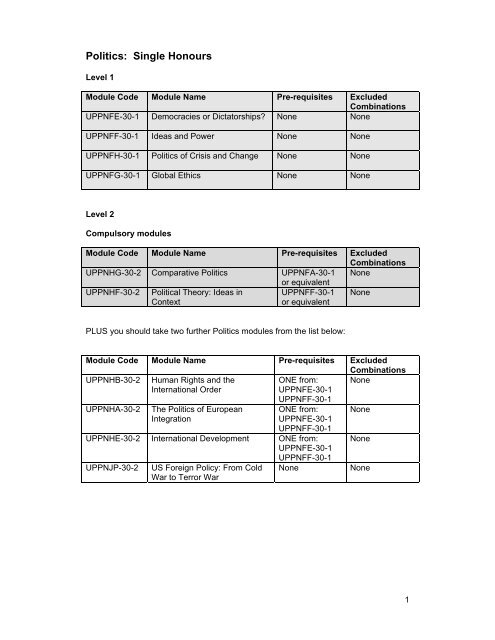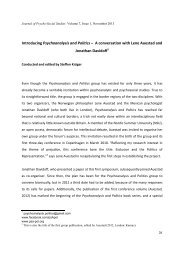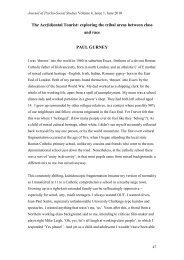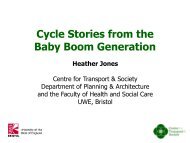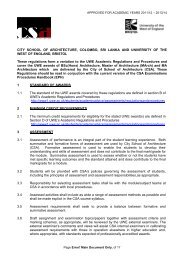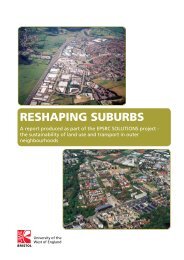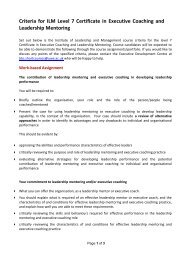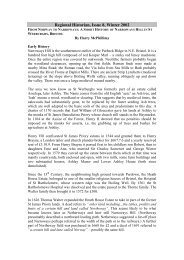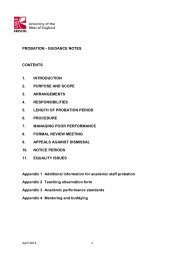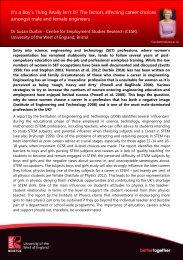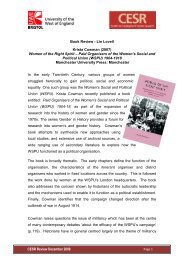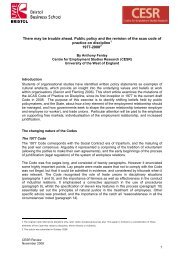Module information for Politics
Module information for Politics
Module information for Politics
You also want an ePaper? Increase the reach of your titles
YUMPU automatically turns print PDFs into web optimized ePapers that Google loves.
<strong>Politics</strong>: Single HonoursLevel 1<strong>Module</strong> Code <strong>Module</strong> Name Pre-requisites ExcludedCombinationsUPPNFE-30-1 Democracies or Dictatorships? None NoneUPPNFF-30-1 Ideas and Power None NoneUPPNFH-30-1 <strong>Politics</strong> of Crisis and Change None NoneUPPNFG-30-1 Global Ethics None NoneLevel 2Compulsory modules<strong>Module</strong> Code <strong>Module</strong> Name Pre-requisites ExcludedCombinationsUPPNHG-30-2 Comparative <strong>Politics</strong> UPPNFA-30-1 Noneor equivalentUPPNHF-30-2 Political Theory: Ideas inContextUPPNFF-30-1or equivalentNonePLUS you should take two further <strong>Politics</strong> modules from the list below:<strong>Module</strong> Code <strong>Module</strong> Name Pre-requisites ExcludedCombinationsUPPNHB-30-2 Human Rights and theInternational OrderONE from:UPPNFE-30-1NoneUPPNHA-30-2The <strong>Politics</strong> of EuropeanIntegrationUPPNFF-30-1ONE from:UPPNFE-30-1UPPNFF-30-1UPPNHE-30-2 International Development ONE from:UPPNFE-30-1UPPNFF-30-1UPPNJP-30-2US Foreign Policy: From ColdWar to Terror WarNoneNoneNoneNone1
Level 3Choose FOUR modules<strong>Module</strong> Code <strong>Module</strong> Name PrerequisitesExcludedCombinationsUPPNGB-30-3 Ethical Issues in <strong>Politics</strong> None NoneUPPNJB-30-3 Theories of Justice ONE from: NoneUPPNFF-30-1UPCPAA-30-1UPPNGP-30-3 Policy-making in Britain None NoneUPPQRB-30-3 The <strong>Politics</strong> of Latin American NoneNoneUnderdevelopmentUPPNHK-30-3 The <strong>Politics</strong> of Climate Change None NoneUPPNJN-30-3 Theories and Practices ofSecuritisationNoneUPPNJA-30-3 <strong>Politics</strong> Project 90 Level 2creditsincludingUPPNHG-30-2orUPPNHF-30-2UPPNJJ-30-3 <strong>Politics</strong> in the Workplace: Linking UPPNHG-30-2Theory and PracticeorUPPNHF-30-2NoneUPPNJJ-30-3UPPNJG-30-3UPPNJA-30-32
<strong>Politics</strong> Joint Degree (except International Relations and<strong>Politics</strong>)Level 1<strong>Module</strong> Code <strong>Module</strong> Name Pre-requisites ExcludedCombinationsUPPNFE-30-1 Democracies or Dictatorships? None NoneUPPNFF-30-1 Ideas and Power None NoneLevel 2<strong>Module</strong> Code <strong>Module</strong> Name Pre-requisites ExcludedCombinationsUPPNHG-30-2 Comparative <strong>Politics</strong> UPPNFE-30-1 Noneor equivalentUPPNHF-30-2 Political Theory: Ideas inContextUPPNFF-30-1or equivalentNoneLevel 3Choose TWO modules<strong>Module</strong> Code <strong>Module</strong> Name PrerequisitesExcludedCombinationsUPPNGB-30-3 Ethical Issues in <strong>Politics</strong> None NoneUPPQRB-30-3 The <strong>Politics</strong> of Latin American NoneNoneUnderdevelopmentUPPNHK-30-3 The <strong>Politics</strong> of Climate Change None NoneUPPNJA-30-3 <strong>Politics</strong> Project 90 Level 2creditsincludingUPPNHG-30-2orUPPNHF-30-2UPPNJJ-30-3<strong>Politics</strong> in the Workplace: LinkingTheory and PracticeUPPNHG-30-2orUPPNHF-30-2UPPNJJ-30-3UPPNJG-30-3UPPNJA-30-3UPPNJG-30-33
<strong>Politics</strong> <strong>Module</strong> OutlinesBe<strong>for</strong>e reading this section, check the earlier part of this document to see whichmodules are offered on your award.LEVEL 2UPPNHG-30-2Comparative <strong>Politics</strong><strong>Module</strong> leader: TBCThis module focuses on the uses of comparative politics. The module will draw upon anumber of themes <strong>for</strong> comparison, which include some of the following;democratization, elections and political parties, political recruitment andrepresentativeness; political communication; political culture, government <strong>for</strong>mation;public policy, territorial and regional issues. The module develops student awarenessof both quantitative methods (such as; surveys, content analysis, aggregate dataanalysis), and qualitative methods (such as; participant observation, interviews,analysis of documents and personal records).Assessment: group work 15%; presentation 20%; research report 35%; exam 30%UPPNHF-30-2Political Theory: Ideas in Context<strong>Module</strong> leader: Nick Buttle/ Simon ThompsonThis module is concerned with examining political ideas in their historical andideological contexts. The first part of the module considers some political ideas fromthe classical to the modern periods by exploring the work of some key political thinkers,such as Plato, Machiavelli, Hobbes, Burks and Marx. The second part of the moduleconsiders political ideas in the context of political ideologies and examines ideologiessuch as liberalism, conservatism, socialism, and feminism.Assessment: two essays worth 25% each; exam 50%UPPNGY-30-2Theories of International Relations<strong>Module</strong> Leader: Aida AbzhaparovaThis module introduces second year students to a range of theories of internationalrelations. The module identifies some of the purposes and challenges in theory-buildingin the study of global politics. It covers traditional approaches, such as Realism andLiberalism, as well as alternative approaches such as Feminism. Key issues incontemporary global politics are used to illustrate the application and importance ofthese theories.Assessment: text review presentation 20%; structured essay 20%, research proposal20%; seminar contribution 10%; exam, 30%4
UPPNJP-30-2US Foreign Policy: From Cold War to War on Terror<strong>Module</strong> leader: Stephen McGlincheyThis module considers a range of pivotal US <strong>for</strong>eign policies from 1945-present day.Case studies will be selected from a range including, NSC-68 and the early evolutionof Cold War containment; The Cuban Missile Crisis; The Vietnam war; Detente withthe Soviet Union; Iran and the Nixon Doctrine; Cold war arms and oil; The CarterDoctrine; The Iraq war of 1991; Clinton’s Dual Containment of Iran and Iraq; GWBush and the National Security Strategy of 2002; and Obama and the return ofmultilateralism.Assessment: two hour examination 40%; one 3000 word essay 40%; two 10 minuteassessed presentations 20%UPPNHE-30-2International Development<strong>Module</strong> leader: Peter CleggThe module examines the issue of development in all of its many aspects in Africa,Latin America and the Caribbean. The three regions are facing very significantchallenges as a consequence of globalisation, and these are considered. The modulealso looks at the national and regional problems that are limiting development. Inaddition, the policy responses to these numerous challenges are also analysed. Moreespecially, the module focuses on country-specific case studies and particular topics(such as water rights, biofuels, logging, and conflict and intervention) to shed light onthe process of development. Further, the module includes lectures and seminars on thetheories of development; the role of history and the impact of imperialism on presentday societies in the three regions; the role of the state; the influence of internationalinstitutions and multi-national companies in the ‘South’; the effect of ethnic conflict; andthe contribution of China, India and other large developing countries in encouragingdevelopment.Assessment: two, 1½ hour examinations (50%), and two essays (50%)LEVEL 3UPPNGB-30-3Ethical Issues in <strong>Politics</strong><strong>Module</strong> leader: Nick ButtleThis module will examine some ethical issues which have and impact on politics. Thefirst part of the module will consider different interpretations of the nature of ethics anddifferent theories of ethics. The second part of the module will consider issues to dowith public policy such as penal, health and defence policy. The final part of the modulewill consider issues concerning political action, such as issues of obligation anddisobedience.Assessment: case study 30%; essay 20%; exam 50%6
UPPNJB-30-3 Theories of Justice<strong>Module</strong> leader: Simon ThompsonIn this module, a critical survey is conducted of several of the most important theoriesof justice in contemporary political philosophy. We focus in particular on themulticultural character of contemporary societies, and seeks to determine howeffectively political philosophers have responded to this. The philosophers to be studiedinclude Brian Barry, Will Kymlicka, Charles Taylor and Anne Phillips. The practicalissues to be discussed include freedom of speech, freedom of religion, political selfdetermination& political representation.Assessment: essay 25%; case-study 35%; exam 40%UPPNGG-30-3Europe in the World<strong>Module</strong> leader: Gunter WalzenbachThis module is designed to provide an insight into the current academic debate onEuropean integration and the role of Europe in international affairs. This is achieved byinitially examining briefly the historic development and context of European integrationand then proceeding with analysing a number of particular EU institutions and policymaking process. Topics covered range between the new regionalism to a detailedexamination of the role of the EU in its international environment (the EU as an actor inworld politics). Overall, the position and future of Britain within the EU will be put in thecontext of the global role the EU is playing.Assessment: seminar presentation 10%; position paper <strong>for</strong> simulation game 10%;essay 30%; exam 50%UPPNGP-30-3Policy-making in Britain<strong>Module</strong> leaders: Alan GreerThis module allows students to discuss interesting policy issues in contemporaryBritain. It requires no prior study of the UK policy and political process, only a keeninterest in contemporary policy developments in areas such as education, health,defence, the environment, law and order, and anti-terrorism policy, It focuses on theinfluence of policy actors such as parliament, the Prime Minister, and pressure groups,and on the impact of international organisations on Britain, including the EU and theUnited Nations. The module offers a different perspective on topics that students mayhave covered in other areas of their studies, <strong>for</strong> example issues considered includepolicy on education (e.g. re<strong>for</strong>m of schools, student fees), health, the environment, lawand order, defence and <strong>for</strong>eign policy, anti-terrorism policy, drug and alcohollegislation, and policy on asylum and immigration. Students may also take aninternational focus, looking at the role of EU and global organisations in the UK policyprocess, <strong>for</strong> example on the Iraq War and climate change.Assessment: case study proposal 20%; case study essay 35%; exam 45%7
UPPQRB-30-3<strong>Politics</strong> of Latin American Underdevelopment<strong>Module</strong> leader: Peter CleggThe reasons <strong>for</strong> the political and economic underdevelopment of Latin America areexplored in this module. The course examines the <strong>for</strong>mative influence on Latin Americaof European imperialism and US intervention. It applies theories of development anddependency to issues such as <strong>for</strong>eign debt, <strong>for</strong>eign aid and international trade. Aspectsof the state in Latin America, including authoritarianism, democratisation and theconflicts with guerrilla movements, social organisations and drug traffickers arecovered.Assessment: presentation 20%; essay 30%; exam 50%.UPPNJM-30-3Global Governance<strong>Module</strong> leader: Gunter WalzenbachGlobal governance refers to the various <strong>for</strong>ms of authority that regulate human affairson a worldwide scale. In contrast to state–centred responses to globalisation it focuseson the interaction and partnership of public, private, non–governmental, regional andinternational organizations to provide practical solutions to complex policy problems.The course will offer students the opportunity to develop their own case studies andexplore processes of trans–national rule–making in key areas such as world trade,regional security and environmental resource management. One of the key objectivesis to sensitise participants to the country context within which an international order iscreated. To this end the linkages with democracy promotion, empire–building and geo–politics are examined.Assessment: group presentation 20%, case–study report 30%, exam 50%UPPNHK-30-3The <strong>Politics</strong> of Climate Change<strong>Module</strong> leader: Alan GreerThis module focuses on developing a comprehensive understanding of the nature ofclimate change, the mechanisms that generate it, and its political and policyimplications. It will consider a range of themes around the contested politics of climatechange, including the nature the ‘evidence’, channels and <strong>for</strong>ms of communication, andof the <strong>for</strong>ces supporting and opposing action to tackle the ‘problem’, including thepolitics of climate change scepticism. At the level of policy, the module will focus onselected interventions (e.g. transport, energy and food sectors) by institutions andactors (governments, movements and networks) around its mitigation and adaptation atglobal, EU, national, regional and local levels. Other core themes include considerationof climate change futures – the ‘good society’ or the ‘long descent’.Assessment: 60% coursework, exam 40%8
UPPNJN-30-3Theories and Practices of Securitisation<strong>Module</strong> leader: Aida AbzhaparovaThis module will introduce students to existing theories and current practices ofsecuritisation. This module will be divided into three sections. In the first section of themodule students will have an opportunity to develop an understanding of a variety oftraditional theories in the sub-discipline of Security Studies. The second section willfocus specifically on alternative theories of security that widen and deepen bothconcepts and practices of security. The first two sections of the module willcomplement the study conducted in the third section of the module where traditionaland alternative academic theoretical debates on security will be integrated in theinvestigation of prominent issues and practices of contemporary global, international,regional and local securities.Assessment: two hour exam 40%; 2000 word research evaluation exercise 20%; 2000word essay; 2000 word security reportUPPNJA-30-3<strong>Politics</strong> Project <strong>Module</strong><strong>Module</strong> leader: TBCThe project is a written study of around 10-12,000 words on a subject agreed with<strong>Politics</strong> tutors which is within the general field of politics and international relations. Withinthe constraints set by library resources and staff intellectual expertise, it allows studentsto study subjects in which they are interested and which are either different from thosetaught on courses or to pursue issues which they have already studied in greater depth.It is particularly suited to motivated students who are able to work well on their own,those expecting to study at post-graduate level, and those developing a specialism linkedto their future career. Though supervision is provided, students are required to studyindependently.Be<strong>for</strong>e selecting this module you need to have an idea about the subject <strong>for</strong> the projectand you should have a discussion with a member of staff with the relevant knowledge. Ifyou cannot think of a subject <strong>for</strong> a project this module is not <strong>for</strong> you.Assessment: progress report 20%; final written project 80%UPPNJJ-30-3<strong>Politics</strong> in the Workplace: linking theory and practice<strong>Module</strong> Leader: Alan GreerThis module involves 20 days of work experience in an organisation involved inpolitically relevant activity. It has been designed to enable students to experiencedecision-making and working practices beyond the normal learning environment of theuniversity. Students will be required to carry out meaningful tasks <strong>for</strong> the hostorganisation (which may include liaising with other outside bodies). The assessmentwill require students to critically reflect upon the aims and outcomes of the tasks set,and relate the work experience to key political theories, arguments and debates asstudied in level 2 modules.Assessment: logbook 10%; presentation 20%; report 70%9


